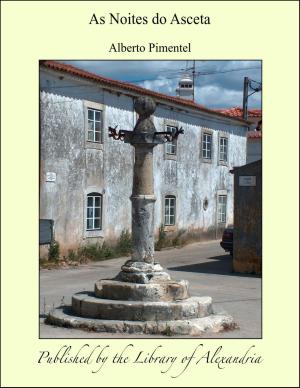| Author: | Marie Corelli | ISBN: | 9781465537317 |
| Publisher: | Library of Alexandria | Publication: | March 8, 2015 |
| Imprint: | Language: | English |
| Author: | Marie Corelli |
| ISBN: | 9781465537317 |
| Publisher: | Library of Alexandria |
| Publication: | March 8, 2015 |
| Imprint: | |
| Language: | English |
A HEAVY storm had raged all day on the north coast of Devon. Summer had worn the garb of winter in a freakish fit of mockery and masquerade; and even among the sheltered orchards of the deeply-embowered valley of Combmartin, many a tough and gnarled branch of many a sturdy apple-tree laden with reddening fruit, had been beaten to the ground by the fury of the blast and the sweeping gusts of rain. Only now, towards late afternoon, were the sullen skies beginning to clear. The sea still lashed the rocks with angry thuds of passion, but the strength of the wind was gradually sinking into a mere breeze, and a warm saffron light in the west showed where the sun, obscured for so many hours, was about to hide his glowing face altogether for the night, behind the black vizor of our upward-moving earth. The hush of the gloaming began to permeate nature; flowers, draggled with rain, essayed to lift their delicate stems from the mould where they had been bowed prone and almost broken,—and a little brown bird fluttering joyously out of a bush where it had taken shelter from the tempest, alighted on a window-sill of one of the nearest human habitations it could perceive, and there piped a gentle roundelay for the cheering and encouragement of those within before so much as preening a feather. The window was open, and in the room beyond it a small boy sat at a school-desk reading, and every now and then making pencil notes on a large folio sheet of paper beside him. He was intent upon his work,—yet he turned quickly at the sound of the bird’s song and listened, his deep thoughtful eyes darkening and softening with a liquid look as of unshed tears. It was only for a moment that he thus interrupted his studies,—anon, he again bent over the book before him with an air of methodical patience and resignation strange to see in one so young. He might have been a bank clerk, or an experienced accountant in a London merchant’s office, from his serious old-fashioned manner, instead of a child barely eleven years of age; indeed, as a matter of fact, there was an almost appalling expression of premature wisdom on his pale wistful features;—the ‘thinking furrow’ already marked his forehead,—and what should still have been the babyish upper curve of his sensitive little mouth, was almost though not quite obliterated by a severe line of constantly practised self-restraint. Stooping his fair curly head over the printed page more closely as the day darkened, he continued reading, pondering, and writing; and the bird, which had come to assure him as well as it could, that fine bright weather,—such weather as boys love,—might be expected to-morrow, seemed disappointed that its gay carol was not more appreciated. At any rate it ceased singing, and began to plume itself with fastidious grace and prettiness, peering round at the youthful student from time to time inquisitively, as much as to say,—“What wonder is this? The rain is over,—the air is fresh,—the flowers are fragrant,—there is light in the sky,—all the world of nature is glad, and rejoices,—yet here is a living creature shut up with a book which surely God never had the making of!—and his face is wan, and his eyes are sad, and he seems not to know the meaning of joy!” The burning bars of saffron widened in the western heavens,—shafts of turquoise-blue, pale rose, and chrysoprase flashed down towards the sea like reflections from the glory of some unbarred gate of Paradise,—and the sun, flaming with August fires, suddenly burst forth in all his splendour. Full on Combmartin, with its grey old church, stone cottages, and thatched roofs overgrown with flowers, the cheerful radiance fell, bathing it from end to end in a shower of gold,—the waves running into the quiet harbour caught the lustrous glamour and shone with deep translucent glitterings of amber melting into green,—and through the shadows of the room where the solitary little student sat at work, a bright ray came dancing, and glistened on his bent head like the touch of some passing angel’s benediction. Just then the door opened, and a young man entered, clad in white boating flannels
A HEAVY storm had raged all day on the north coast of Devon. Summer had worn the garb of winter in a freakish fit of mockery and masquerade; and even among the sheltered orchards of the deeply-embowered valley of Combmartin, many a tough and gnarled branch of many a sturdy apple-tree laden with reddening fruit, had been beaten to the ground by the fury of the blast and the sweeping gusts of rain. Only now, towards late afternoon, were the sullen skies beginning to clear. The sea still lashed the rocks with angry thuds of passion, but the strength of the wind was gradually sinking into a mere breeze, and a warm saffron light in the west showed where the sun, obscured for so many hours, was about to hide his glowing face altogether for the night, behind the black vizor of our upward-moving earth. The hush of the gloaming began to permeate nature; flowers, draggled with rain, essayed to lift their delicate stems from the mould where they had been bowed prone and almost broken,—and a little brown bird fluttering joyously out of a bush where it had taken shelter from the tempest, alighted on a window-sill of one of the nearest human habitations it could perceive, and there piped a gentle roundelay for the cheering and encouragement of those within before so much as preening a feather. The window was open, and in the room beyond it a small boy sat at a school-desk reading, and every now and then making pencil notes on a large folio sheet of paper beside him. He was intent upon his work,—yet he turned quickly at the sound of the bird’s song and listened, his deep thoughtful eyes darkening and softening with a liquid look as of unshed tears. It was only for a moment that he thus interrupted his studies,—anon, he again bent over the book before him with an air of methodical patience and resignation strange to see in one so young. He might have been a bank clerk, or an experienced accountant in a London merchant’s office, from his serious old-fashioned manner, instead of a child barely eleven years of age; indeed, as a matter of fact, there was an almost appalling expression of premature wisdom on his pale wistful features;—the ‘thinking furrow’ already marked his forehead,—and what should still have been the babyish upper curve of his sensitive little mouth, was almost though not quite obliterated by a severe line of constantly practised self-restraint. Stooping his fair curly head over the printed page more closely as the day darkened, he continued reading, pondering, and writing; and the bird, which had come to assure him as well as it could, that fine bright weather,—such weather as boys love,—might be expected to-morrow, seemed disappointed that its gay carol was not more appreciated. At any rate it ceased singing, and began to plume itself with fastidious grace and prettiness, peering round at the youthful student from time to time inquisitively, as much as to say,—“What wonder is this? The rain is over,—the air is fresh,—the flowers are fragrant,—there is light in the sky,—all the world of nature is glad, and rejoices,—yet here is a living creature shut up with a book which surely God never had the making of!—and his face is wan, and his eyes are sad, and he seems not to know the meaning of joy!” The burning bars of saffron widened in the western heavens,—shafts of turquoise-blue, pale rose, and chrysoprase flashed down towards the sea like reflections from the glory of some unbarred gate of Paradise,—and the sun, flaming with August fires, suddenly burst forth in all his splendour. Full on Combmartin, with its grey old church, stone cottages, and thatched roofs overgrown with flowers, the cheerful radiance fell, bathing it from end to end in a shower of gold,—the waves running into the quiet harbour caught the lustrous glamour and shone with deep translucent glitterings of amber melting into green,—and through the shadows of the room where the solitary little student sat at work, a bright ray came dancing, and glistened on his bent head like the touch of some passing angel’s benediction. Just then the door opened, and a young man entered, clad in white boating flannels















